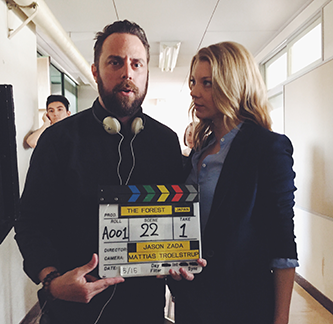Inspiration meets innovation at Brandweek, the ultimate marketing experience. Join industry luminaries, rising talent and strategic experts in Phoenix, Arizona this September 23–26 to assess challenges, develop solutions and create new pathways for growth. Register early to save.
After spending last year completing a feature film, I came back into the advertising industry energized, fresh eyed, and realized something pretty profound. This is the most exciting time in history to be a storyteller. Anything we can dream up is now possible – and I honestly mean anything.
Dream it up and someone can make it.

Zada with Natalie Dormer, star of The Forest.
We now have a gazillion screens to tell our stories on. And each screen doesn't have to tell a different story. Stories can be multi-screened and complexly told across a variety of technologies. Every brand is a storyteller, and every person who creates and executes ideas for the brand is a storyteller in turn. The world is, at this very moment, a storyteller's oyster. Hell, it's an oyster topped with caviar and truffles. This year, the advertising industry will spend almost $600 billion on advertising. Just think of the stories we can tell if we channel that money in the right directions.
The act of telling a story is 10,000 years old. It's in our DNA as humans. We want stories that engage us—make us laugh, cry, think, dream, love and every human emotion in-between. We want to be entertained. But the advertising industry isn't creating enough compelling stories that people actively seek out. Hollywood is brilliant at it. And consider that Hollywood had its best year ever in 2015, with a global record of $38 billion dollars at the box office, it shows no signs of slowing down.
Additionally, it's been declared that we are in the golden age of television. As an audience, we are hungrier than ever for good entertainment. We consume entertainment on our TV, our computers, our mobile devices and our VR headsets – everywhere and everyplace. Quality content is all around us, but we still seek out more. Brands can become publishers of quality content if we step up to it.
Although this exciting new world of storytelling is sitting right in front of us, so many agencies, along with their clients, still operate in an archaic, media-driven way. They buy the media, they brief the agency, which then creates the idea, hires the production company, builds the idea, and then places it on the pre-purchased media. We fill the round hole with the round peg. This is the way it's been done for decades.
There are, of course, a few rogue projects that agencies create to win awards and prove to their clients that they are innovative, but a considerable amount of work being produced is still traditional media, produced traditionally, by traditional thinking. There has to be a better way, right?
There is no easy way to say this, so I'll just get to the point—we have to kill advertising. We have to run it out of town with pitchforks and burn it to the ground. We need to rethink and change how we approach everything, immediately. The traditional way of thinking is finished. It's an antiquated model that doesn't apply to the new world we live in. We are in need of a radical shift away that pulls us away from advertising and pushes us closer to becoming better storytellers. We need to clear the slate, start over and reimagine how we can tell new stories for an incredibly complex new world, from the ground up.
Let's think about how Hollywood creates and generates intellectual property in these modern times. It all starts with the story. A big, interesting, compelling story. The ultimate crown jewel of any studio is to create a franchise. Something with longevity. From that single idea, that highly prized concept, they will create a movie, toys, video games, t-shirts and everything else you can think of. James Bond toilet paper? Why not? We'll buy it because we love the story and the characters that live within the world they inhabit. It becomes part of our lives. We plaster the posters on our walls and wear the t-shirt. In short, we are fans.
So how could advertising learn something from this? We should strive to create long lasting stories and characters instead of disposable ones. Hollywood creates Storyworlds—fictional worlds or universes that are created to play out a story narrative across multiple platforms. Instead of campaigns, or ads, why can't we create Storyworlds? We obviously have the ability to create interesting narratives that stretch across various media, across screens and across devices. It's been done before.
Stories can and should be told on a global level. No one makes a different feature film for every region. They find big concepts and experiences that work universally. It might sound ludicrous to compare Hollywood to the advertising industry, but if you think about it, all the pieces are already there. It's just how we assemble them differently that could change everything. We should be assembling teams of dreamers and executors. A producer, writer, director, designer, story architect and technologist could be the perfect team of collaborators.
In this framework, we could create a story and then decide how and how and where it should be told. We could collaborate with production partners and media partners to realize our Storyworld and give it life.
The way we can tell these stories is seemingly endless. We could create a pre-roll trailer, television commercial, live streaming event, a VR experience, experiential event, short series, feature film, installation, a product, museum exhibit, a music album, a music album's complimentary film; anything you can dream up.
Whatever it is, the story, not technology or media, should drive the narrative. If we make something that is original and entertaining, the audience will get excited about it and tell their friends. We'll create fans. There is no reason why Audi can't create the next James Bond, versus just product placing it in a film. A brand will likely win an Academy Award in the next few years—it's bound to happen.
So the only thing that's preventing us from using our budgets to create real, engaging pieces of entertainment is, well, us. We can make entertainment that lasts beyond the media that was purchased to run it. We can tell stories that are incredibly powerful and long lasting. Take off the shackles, dream big and let's declare the end of old advertising once and for all. Like I said previously, there has never been a better time in history to be a storyteller. So what are we waiting for?
Jason Zada (@jasonzada) is a film director, music video director, screenwriter and digital marketer. He is director of current theatrical release The Forest.








